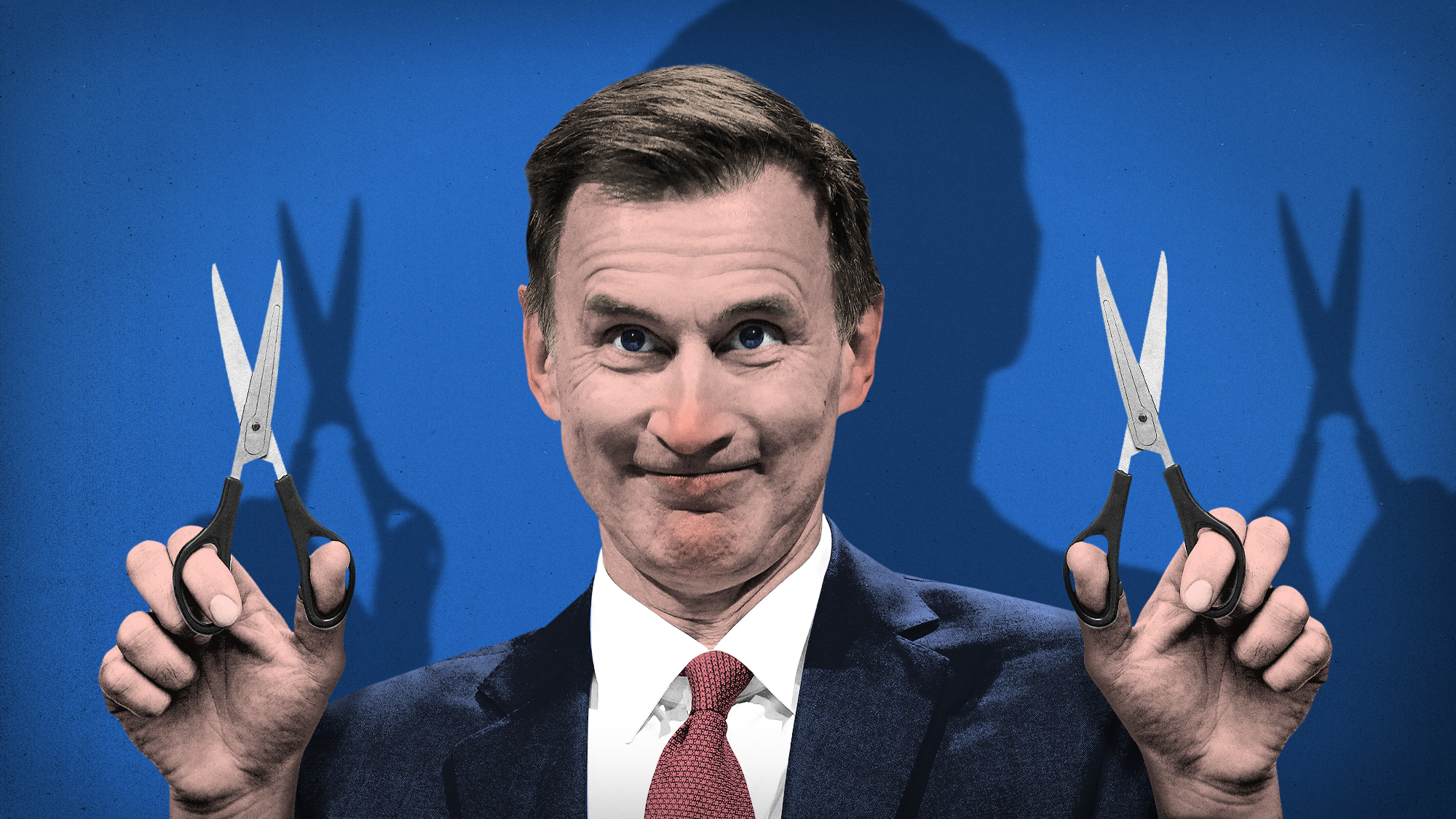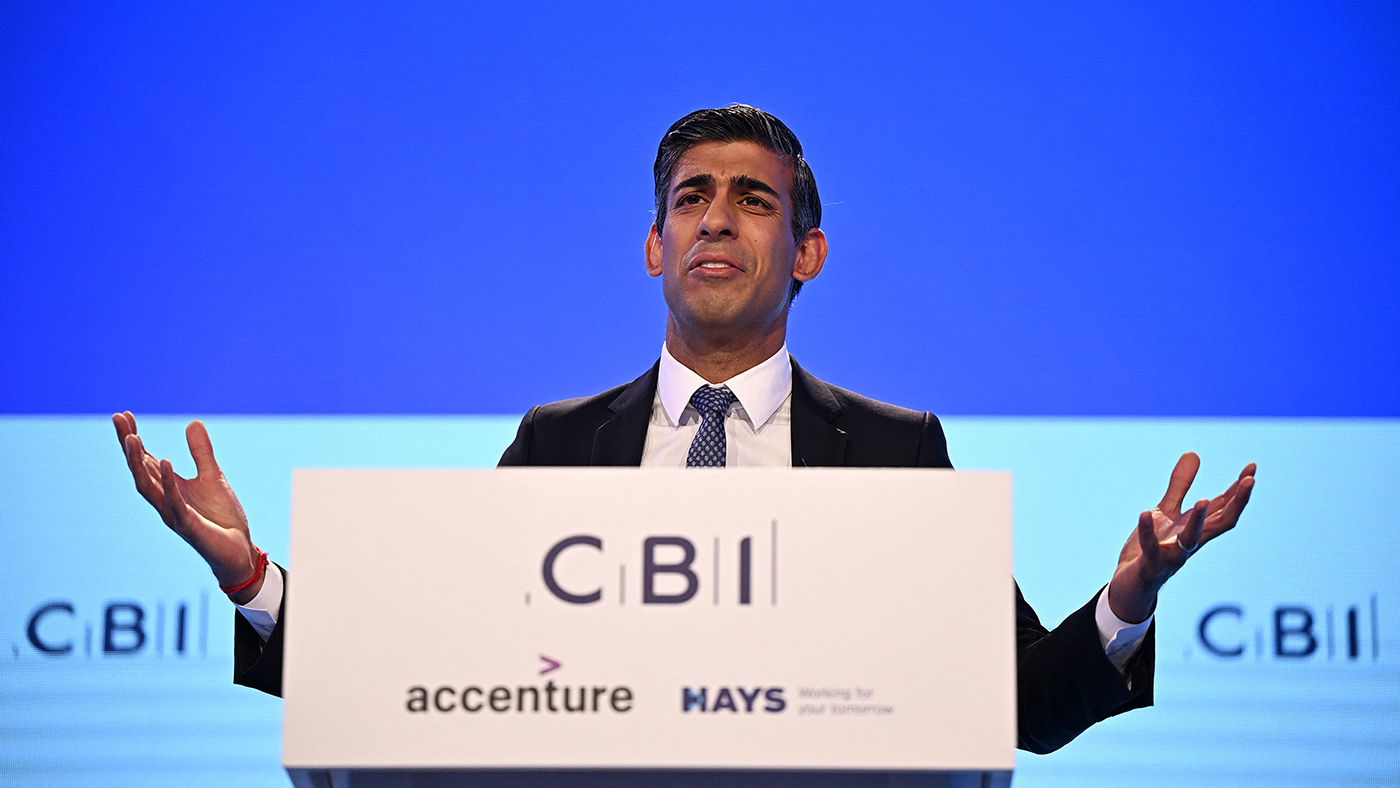Autumn Statement 2016: Real wages will not grow for a decade, says IFS
Think-tank warns of 'dreadful' times ahead, as Resolution Foundation say lower-income families will lose most
A free daily email with the biggest news stories of the day – and the best features from TheWeek.com
You are now subscribed
Your newsletter sign-up was successful
Autumn Statement: CBI calls for £2bn maternity leave extension
27 October
Philip Hammond has been urged to boost maternity pay to encourage more women into work as part of his Autumn Statement next month.
The move is part of an £11.5bn "shopping list" of measures the Confederation of British Industry (CBI) has asked the new Chancellor to adopt at his first set-piece speech next month, says The Guardian.
The Week
Escape your echo chamber. Get the facts behind the news, plus analysis from multiple perspectives.

Sign up for The Week's Free Newsletters
From our morning news briefing to a weekly Good News Newsletter, get the best of The Week delivered directly to your inbox.
From our morning news briefing to a weekly Good News Newsletter, get the best of The Week delivered directly to your inbox.
As many of the policies would boost productivity, the organisation says the increased level of new spending would still see Hammond "meet his goal of balancing the books over the business cycle".
That's a different concept to achieving a government surplus by 2020-2021, which was the policy goal of his predecessor at No 11, George Osborne.
Hammond has said the Brexit vote necessitates a fiscal "reset" – and Resolution Foundation think-tank warned this week that a hit to growth since June could lead to £84bn more borrowing over the next five years.
Most eye-catching among the CBI's demands are for paid maternity leave to be extended from the current 39 weeks to a full year, when support for childcare costs is available to new parents.
A free daily email with the biggest news stories of the day – and the best features from TheWeek.com
This would cost £2.1bn, but the group says it would encourage more women back into work and so be beneficial to the economy.
Elsewhere, the CBI calls for £6bn of new spending on infrastructure each year, taking investment back above two per cent of GDP, and wants the emphasis of new projects switched from London and the south-east to the "west, Midlands and north", with particular support for road-widening schemes and rail upgrades.
CBI director general Carolyn Fairbairn (pictured above) said: "The Chancellor should capitalise on the UK’s core strengths, setting out a pro-enterprise agenda that instils confidence and kick-starts investment."
The group will be backed by London Mayor Sadiq Khan tonight, who will say the government "will not only be judged on the Brexit deal… but on how this delicate period leading up to Brexit is handled", reports the Financial Times.
Not everyone supports the calls for more maternity leave, however. Lady Barbara Judge, the chair of the Institute of Directors, sparked controversy this month when she said taking a year off work was "bad" for women and left them exposed if redundancies were needed.
Autumn Statement: Calls for 'far-reaching' tax reform
20 October
A group of 14 senior business leaders, including the deputy chairman of the Institute of Directors, has called for "far-reaching" reform of taxation at next month's Autumn Statement.
In a letter to The Times the signatories, who also include Luke Johnson, the venture capitalist who built up Pizza Express, and private equity investor Jon Moulton, complain that the "excessively complex" UK tax code, which stretches to "20,000 pages", is holding back growth.
"While the UK is a great place to start a business, with more than half a million founded last year, the number that succeed in growing significantly is still relatively small. Our tax code…represents a significant challenge to our most ambitious companies," the letter says.
It adds that the Brexit vote "will be a catalyst for great change" and that the Autumn Statement must be "far-reaching" in reforming everything from business rates to corporation tax.
"Few areas are in as urgent need of reform as our excessively complex tax system, which does not sufficiently distinguish between SMEs and multinationals or recognise the impact of small businesses on job creation," the writers say.
In a report published today by the Institute of Directors, Grant Thornton and the entrepreneurs group Prelude put flesh on the bones of their call by recommending specific changes to national insurance, corporation tax and business rates.
In particular, they recommend an extension of employer national insurance relief to encourage small companies to hire staff, a higher threshold for smaller firms to pay company taxes annually rather than quarterly, and more exemptions from business rates.
Longer term, the report also calls for consultation on a new "SME tax" to replace corporation tax for small firms, which would be simpler to administer, as well as a US-style "S Corporation" system designed to shift the tax burden for firms with less than 100 shareholders onto their owners through their tax returns.
Jonathan Riley, head of tax at Grant Thornton, said: "An effective and efficient system which makes it easier to pay – and collect – the appropriate levels of tax from companies of all sizes would free up resources to enable growth across the economy."
Autumn Statement could see borrowing and spending boosted
6 October
Chancellor Philip Hammond is now expected to announce a sizeable expansion in infrastructure spending, funded by new borrowing, when he delivers his Autumn Statement next month.
He had already talked about a "fiscal reset" and confirmed earlier this week in his speech to the Conservative Party conference that the target of clearing the deficit by 2020 has been dropped.
While the scale of any new spending to boost the economy in the wake of the Brexit vote remains unclear, the closing speech to the Conference by Theresa May yesterday signalled a radical departure from the policies of her predecessors.
The Prime Minister is "backing a break away from the monetary policy pursued by George Osborne and a move towards more fiscal measures, such as tax and spending," says the Daily Telegraph.
In particular, May criticised a reliance on "super-low interest rates and quantitative easing" to boost rates, saying people with assets "had got richer" while those without "have suffered".
She said: "A change has got to come – and we are going to deliver it."
That means more spending on infrastructure projects to provide a long-term boost to the economy, George Freeman, the Conservative MP who chairs May's policy board, told the BBC's Newsnight yesterday.
He said: "With money available at [effectively] nought percent, we want to drive an industrial strategy, get infrastructure built. We need to make sure we are looking at all the mechanisms to making sure that money flows properly."
Freeman and others close to the PM say the government will not intervene in the Bank of England's policy-setting or compromise its independence.
Instead, the government will use fiscal policy tools to protect the economy from a Brexit-related downturn.
So how much largesse can we expect from Chancellor Hammond? The Tories have already this week confirmed support for HS2 and hinted that a third runway at Heathrow will be approved. Beyond that, however, there has been little clarity.
The BBC's Kamal Ahmed says Hammond remains a "fiscal hawk", with his speech emphasising the need for discipline and to retain a focus on fixing the deficit.
"Hammond denounced what he said were Labour's economic failures of the past, the clear message being that borrowing too much can only lead to one destination. An economic mess," said the journalist.
Hammond could have £40bn for Autumn Statement boost
12 September
Philip Hammond, the new Chancellor, may have as much as £40bn of firepower to boost the UK economy when he delivers his first Autumn Statement, without damaging the markets' view, according to one expert.
Last week, the Chancellor hinted in a parliamentary hearing that the Autumn Statement scheduled for 23 November would see a splurge on UK infrastructure designed to boost growth in the wake of the Brexit vote.
Hammond has already indicated that he will focus on "modest, rapidly deliverable investments" on roads and railways. Magdalena Polan, an economist at Legal & General Investment Management, believes the Chancellor could have an amount equivalent to two per cent of GDP to deploy.
This figure is based on government debt costs falling following the Bank of England's decision to cut base interest rates and ramp up bond-buying, as well as Hammond abandoning a commitment to return the public finances to surplus by the end of the decade.
Polan told the Daily Telegraph: "Under the new Chancellor and his push for a policy 'reset', and with the quantitative easing expansion by the Bank of England after the Brexit vote, there is indeed that extra space [of up to £40bn] to use."
She added: "So if there is indeed a relaxation of fiscal policy, it could take many forms: income tax cuts, VAT cut, higher social spending and then also infrastructure spending, among others".
Focus has fallen on infrastructure spending as experts doubt the potential for company tax cuts to boost the economy. In fact, the Telegraph reckons the Chancellor has hinted he will abandon his predecessor's plan to cut corporation tax to as low as 15 per cent.
Hammond is said to have told European finance ministers at a meeting in Bratislava that he is instead sticking to a previous plan to cut the rate to 17 per cent by 2020.
The scale of any splurge at the Autumn Statement will depend on the hit that the Office for Budget Responsibility reckons the economy will face in the coming years after the Brexit vote in June.
A forecast from the British Chambers of Commerce this morning estimated the UK "would skirt with" but avoid a recession next year and would experience a growth of one per cent.
The keenly-watched purchasing managers' index from Markit last week showed a record month-on-month jump in service sector activity back into growth territory, after a slump in July.
Chris Williamson, its chief economist, says this suggests an "imminent recession will be avoided".
Autumn Statement 2016: What will Philip Hammond unveil?
9 September
Philip Hammond is to deliver his first Autumn Statement as Chancellor on 23 November – and has hinted that he intends to spend money on roads and railways.
Hammond announced the date as he began giving evidence to the Economic Affairs Committee in the Lords yesterday afternoon, saying he would consult businesses and employees in the intervening months.
"In the run-up to the Autumn Statement I will be engaging with Britain's business leaders and employee representatives through a series of industry round tables, meetings and visits," he said.
While not committing himself, the Chancellor implied he plans to provide a boost to Britain's roads and railways – but not to splurge on larger-scale infrastructure projects.
He said: "I think there is a role for big, strategic projects, but they are unlikely to be ever able to contribute to fiscal stimulus because of the timelines involved.
"Often it is modest, rapidly deliverable investments that can have the most immediate impact, particularly on the road network, but also in some places on the rail network."
Whatever measures he does take on 23 November, Hammond stressed they must contribute to the "long term investment needs of the country".
While Prime Minister Theresa May has signalled her government will be much less focused on eliminating the UK's national debt than her predecessor's, Hammond said he would not take a "cavalier" approach to the deficit.
He pointed out that May has not said she will abandon deficit reduction altogether, merely that she has thrown aside the deadline of being back in the black by 2020.
Hammond spoke about the housing crisis, saying the current situation was a "toxic mix" of constrained resources for building and "increasing money supply".
The Daily Telegraph highlights Hammond's remarks on the impact of the Brexit vote. The Chancellor said it was "considerably less severe" than what the Bank of England's economists were expecting 'before stimulus was delivered on 4 August", but warned that it was still early to tell what the repercussions might be.
-
 The Olympic timekeepers keeping the Games on track
The Olympic timekeepers keeping the Games on trackUnder the Radar Swiss watchmaking giant Omega has been at the finish line of every Olympic Games for nearly 100 years
-
 Will increasing tensions with Iran boil over into war?
Will increasing tensions with Iran boil over into war?Today’s Big Question President Donald Trump has recently been threatening the country
-
 Corruption: The spy sheikh and the president
Corruption: The spy sheikh and the presidentFeature Trump is at the center of another scandal
-
 Five key takeaways from Jeremy Hunt's Autumn Statement
Five key takeaways from Jeremy Hunt's Autumn StatementThe Explainer Benefits rise with higher inflation figure, pension triple lock maintained and National Insurance cut
-
 Would tax cuts benefit the UK economy?
Would tax cuts benefit the UK economy?Today's Big Question More money in people's pockets may help the Tories politically, but could harm efforts to keep inflation falling
-
 Why UK companies are facing a dystopian, zero-growth future
Why UK companies are facing a dystopian, zero-growth futurefeature In prioritising stability, the Treasury risks ‘stifling enterprise and entrepreneurship’
-
 Labour shortages: the ‘most urgent problem’ facing the UK economy right now
Labour shortages: the ‘most urgent problem’ facing the UK economy right nowSpeed Read Britain is currently in the grip of an ‘employment crisis’
-
 Will the energy war hurt Europe more than Russia?
Will the energy war hurt Europe more than Russia?Speed Read European Commission proposes a total ban on Russian oil
-
 Will Elon Musk manage to take over Twitter?
Will Elon Musk manage to take over Twitter?Speed Read The world’s richest man has launched a hostile takeover bid worth $43bn
-
 Shoppers urged not to buy into dodgy Black Friday deals
Shoppers urged not to buy into dodgy Black Friday dealsSpeed Read Consumer watchdog says better prices can be had on most of the so-called bargain offers
-
 Ryanair: readying for departure from London
Ryanair: readying for departure from LondonSpeed Read Plans to delist Ryanair from the London Stock Exchange could spell ‘another blow’ to the ‘dwindling’ London market